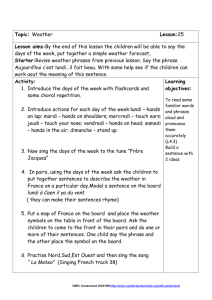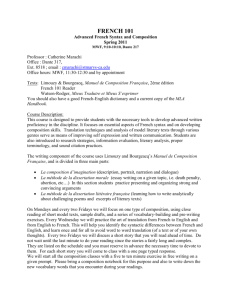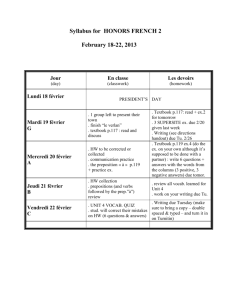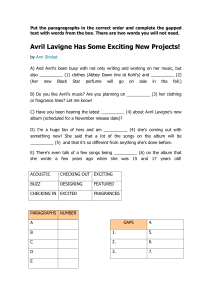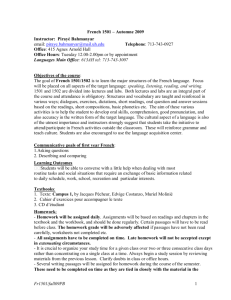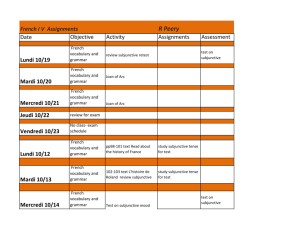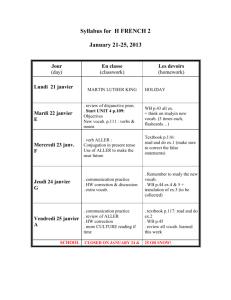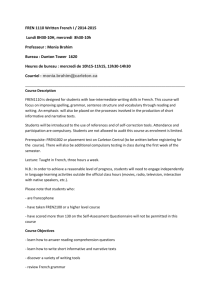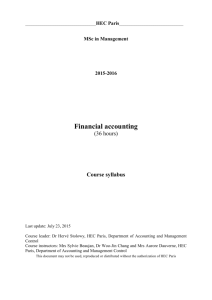Spring 2016 FR 201B: Intermediate French Grammar
advertisement
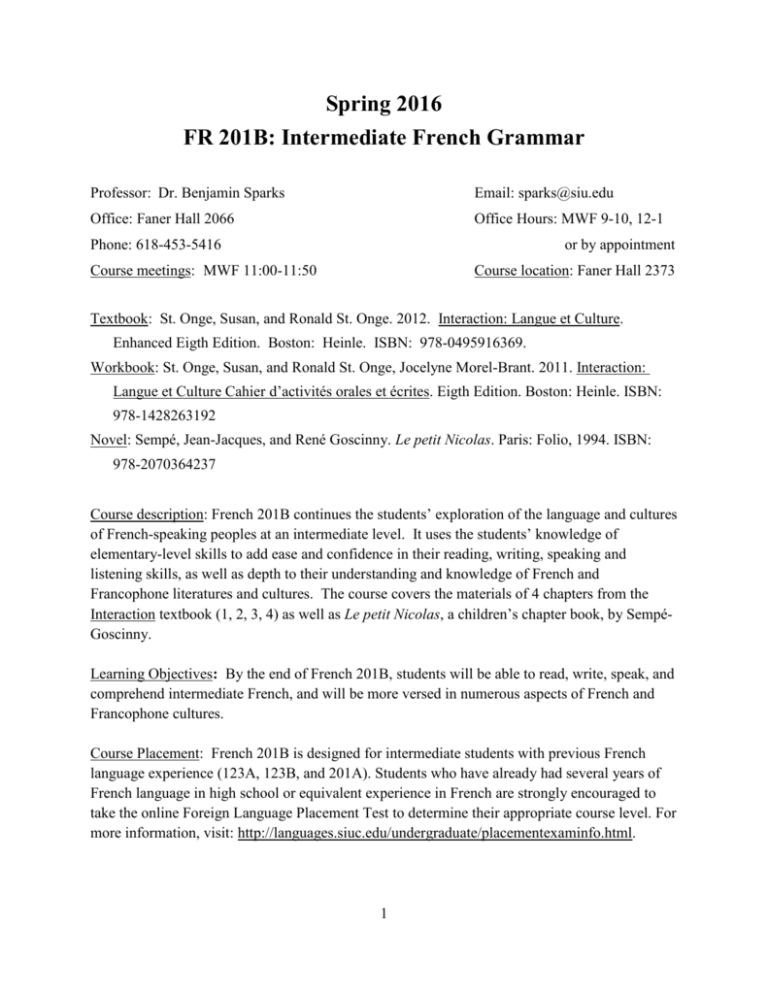
Spring 2016 FR 201B: Intermediate French Grammar Professor: Dr. Benjamin Sparks Email: sparks@siu.edu Office: Faner Hall 2066 Office Hours: MWF 9-10, 12-1 Phone: 618-453-5416 or by appointment Course meetings: MWF 11:00-11:50 Course location: Faner Hall 2373 Textbook: St. Onge, Susan, and Ronald St. Onge. 2012. Interaction: Langue et Culture. Enhanced Eigth Edition. Boston: Heinle. ISBN: 978-0495916369. Workbook: St. Onge, Susan, and Ronald St. Onge, Jocelyne Morel-Brant. 2011. Interaction: Langue et Culture Cahier d’activités orales et écrites. Eigth Edition. Boston: Heinle. ISBN: 978-1428263192 Novel: Sempé, Jean-Jacques, and René Goscinny. Le petit Nicolas. Paris: Folio, 1994. ISBN: 978-2070364237 Course description: French 201B continues the students’ exploration of the language and cultures of French-speaking peoples at an intermediate level. It uses the students’ knowledge of elementary-level skills to add ease and confidence in their reading, writing, speaking and listening skills, as well as depth to their understanding and knowledge of French and Francophone literatures and cultures. The course covers the materials of 4 chapters from the Interaction textbook (1, 2, 3, 4) as well as Le petit Nicolas, a children’s chapter book, by SempéGoscinny. Learning Objectives: By the end of French 201B, students will be able to read, write, speak, and comprehend intermediate French, and will be more versed in numerous aspects of French and Francophone cultures. Course Placement: French 201B is designed for intermediate students with previous French language experience (123A, 123B, and 201A). Students who have already had several years of French language in high school or equivalent experience in French are strongly encouraged to take the online Foreign Language Placement Test to determine their appropriate course level. For more information, visit: http://languages.siuc.edu/undergraduate/placementexaminfo.html. 1 Grading: Attendance: ........... 10% Attendance: Due to the nature of language learning in general, attendance to class is mandatory since it is absolutely critical for developing communicative abilities in French. It is your responsibility to let your instructor know in advance should you need to miss a class. Attendance will be taken at the beginning of every class. If you arrive late, you will receive partial points for attendance. Students using cell phones and/or texting in class will have that class recorded as an absence. Participation: You are expected to read the assigned pages, noted in the course schedule, in the textbook before coming to class and to participate in individual, pair, and group work. If you do not, you will not receive full points for that day. Active participation and proper preparation are all crucial for improving your French. You will be called on to infer meaning, answer questions, and communicate with classmates. You will lose 1 point of the attendance grade for each class missed (i.e. If you miss 4 days then your attendance grade will be 96/100). Exams: ................... 30% There will be an exam given at the end of each chapter (except chapter 3 which will be integrated into the final). These are designed to evaluate your progress in French in the areas of listening, reading, writing, speaking, and cultural knowledge. No late or make-up exams will be given during the semester, but students missing fewer than 5 classes can drop their lowest exam score. Dictations: ......... 10% The students will write a short dictation once a week covering the grammar and vocabulary discussed that week. Composition: .... 10% The students will write a 2-3 page composition about the novel Le petit Nicolas. The student will choose one of the short stories, provide a description of that story and explain why they found that specific story interesting. 2 Oral exam: .......... 10% A group conversation will take place in the professor’s office during office hours on week 15 (The week of April 25th). A sign-up sheet will be passed around closer to the date of the exam. Students are encouraged to actively participate in class in order to prepare for this exam. Final exam: ........ 30% The final exam is a comprehensive exam, over all four chapters studied during the semester, and over all five skills developed in the class (listening, reading, writing, speaking, and cultural knowledge). Final exam date: May 13, 2016 from 10:15-12:15 Grading scale: 90-100=A 80-89=B 70-79=C 60-69=D 0-59=F Course Policies: To achieve success in a Foreign Language class, students must be present, prepared for class, and willing to actively participate in French. They also need to complement classwork with the daily homework assigned by the professor. Absence is no excuse for missed assignment. Academic dishonesty and plagiarism (turning in someone else’s work and words as your own) are not acceptable and will result in a failing grade for the course. For more information about plagiarism, including how to prevent plagiarism, consult the Morris Library Guide on Plagiarism http://libguides.lib.siu.edu/plagiarism. Suspected cases of plagiarism or academic dishonesty will be investigated and pursued according to the corresponding articles of the SIUC Student Conduct Code. When in doubt, cite the source(s) of the information and consult with your professor. You are not allowed to use any translation web site or software for any of your assignments. Dictionaries vs. Translation programs: The use of paper, electronic, and online dictionaries will be permitted, while the use of all translation sites and programs will be strictly prohibited. If you have any doubt about whether a resource is allowed, it is your responsibility to consult with your instructor beforehand. 3 -Dictionaries are permitted resources that allow you to look up one word at a time and receive an entry giving the grammatical function (noun, verb), pronunciation, and a list of English or French equivalent(s) of the word you have looked up. Often examples or other usage notes are given, allowing you to use your knowledge of the language to help you choose an appropriate form when writing, or to understand a given portion of text when reading, based on context. -Translation programs and online translators are prohibited resources that attempt to automatically give a translation of a text into another language. Generally, these programs allow the user to input whole phrases, sentences, or paragraphs. Unlike dictionaries, the user is not given a list of possible equivalents; rather the translator decides for you what words and grammar to use, often without regard for context. Attendance: Learning a foreign language is like learning to play a sport or a musical instrument: it requires regular practice. Since French class is the primary practice space, students are expected to attend class each day, to participate actively during each lesson, and to bring their copies of the required course materials to class every day. Students absent from classes because of required observances of major religious holidays will be excused. It is the student’s responsibility to notify in advance the professor of each class that will be missed. Students must also take the responsibility for making up work missed. . Please take a moment to get to know your neighbor and get their information so that you may ask them what you missed. Name:_____________________________ Phone/Email:_______________________________ Name:_____________________________ Phone/Email:_______________________________ 4 Supplementary Assistance: With the cooperation of SIUC’s Disability Support Services (DSS), each student who qualifies for reasonable supplementary assistance has the right to receive it. Students requesting supplementary assistance must first register with DSS (http://disabilityservices.siuc.edu/) Emergency Procedures: Southern Illinois University Carbondale is committed to providing a safe and healthy environment for study and work. Because some health and safety circumstances are beyond our control, we ask that you become familiar with the SIUC Emergency Response Plan and Building Emergency Response Team (BERT) program. Emergency response information is available on posters in buildings on campus, available on the BERT'S website at www.siuc.edu/emergency/bert.html, the Department of Public Safety's website www.dps.siu.edu (disaster drop down) and in the Emergency Response Guidelines pamphlet. Know how to respond to each type of emergency. Instructors will provide guidance and direction to students in the classroom in the event of an emergency affecting your location. It is important that you follow these instructions and stay with your instructor during an evacuation or sheltering emergency. The Building Emergency Response Team will provide assistance to your instructor in evacuating the building or sheltering within the facility. 5 Class Schedule FR 201B Spring 2016 1 2 Lundi 18 Janvier Mercredi 20 Janvier Vendredi 22 Janvier Martin Luther King, Jr.’s Birthday Introductions Syllabus Un peu de culture contemporaine (pp. 2-3) Lundi 25 Janvier Mercredi 27 Janvier Vendredi 29 Janvier Vocabulaire actif (pp. 4-5) 3 4 Lundi 1 Février Mercredi 3 Février Note culturelle (p.9) Le petit Nicolas « Un souvenir qu’on va chérir » (pp. 5-13) Vendredi 5 Février Note culturelle (p. 20) Le petit Nicolas « Les cow-boys » (pp.14-21) The Imperative The Irregular Verbs être, avoir, faire, aller (pp.10-11) Synthèse L’héritage culturel (pp. 13-16) Lundi 8 Février Mercredi 10 Février Vendredi 12 Février The Partitive (pp. 21-23) Note culturelle (p. 24-25) Le petit Nicolas « Le Bouillon » (pp. 22-29) Lundi 15 Février Mercredi 17 Février Vendredi 19 Février Voilà and Il y a Interactions (pp. 29-31) Review for Exam Examen Chapitre 1 Nouns Articles (pp. 16-19) 5 The Present Tense of –er Verbs Stem-Changing –er Verbs (pp.6-8) 6 6 7 8 Lundi 22 Février Mercredi 24 Février Vendredi 26 Février Un peu de culture contemporaine (pp. 38-39) Vocabulaire actif (pp. 40-41) Regular –ir Verbs Regular –re Verbs (pp. 42-44) Le petit Nicolas « Le football » (pp. 30-38) Lundi 29 Février Mercredi 2 Mars Vendredi 4 Mars Negation (pp. 45-47) Basic Question Patterns (pp. 50-51) Note culturelle (p. 49) L’héritage culturel (pp. 52-53) Le petit Nicolas « On a eu l’inspecteur » (pp. 39-47) Lundi 7 Mars Mercredi 9 Mars Vendredi 11 Mars Irregular –oir Verbs (pp. 59-60) Idioms with ête and avoir (pp. 63-64) Note culturelle (p. 58 & 65) Le petit Nicolas « Rex » (pp. 48-55) Lundi 14 Mars Mercredi 16 Mars Vendredi 18 Mars Les vacances de printemps Les vacances de printemps Lundi 21 Mars Mercredi 23 Mars Reflexive and Reciprocal Verbs (pp. 54-55) 9 10 Review for Exam Examen Chapitre 2 7 Les vacances de printemps Vendredi 25 Mars Un peu de culture contemporaine (pp. 74-75) Le petit Nicolas « Djodjo » (pp. 56-63) 11 12 Lundi 28 Mars Vocabulaire actif Irregular –ir Verbs (pp. 76-79) Descriptive Adjectives Position of Adjectives (pp. 82-85) Lundi 4 Avril Mercredi 6 Avril Il/Elle est and C’est Possessive Adjectives Demonstrative Adjectives (pp. 90-93) 13 14 15 Adverbs : Formation and Position (pp. 96-98) Vendredi 1 Avril L’héritage culturel (pp. 87-89) Le petit Nicolas « Le chouette bouquet » (pp. 64-72) Vendredi 8 Avril Note culturelle (p. 96) Le petit Nicolas « Les carnets » (pp. 73-79) Lundi 11 Avril Mercredi 13 Avril Vendredi 15 Avril The Comparative and Superlative of Adjectives and Adverbs (pp. 101-105) Numbers (pp. 108-109) Review for Exam Examen Chapitre 3 Lundi 18 Avril Mercredi 20 Avril Vendredi 22 Avril Un peu de culture contemporaine (pp.118-119) Vocabulaire actif (pp.122-123) Irregular –oire Verbs Irregular –re Verbs (pp. 126-128) Lundi 25 Avril Mercredi 27 Avril The passé composé with avoir and être (pp. 134-139) 16 Mercredi 30 Mars Basic Question Patterns with the passé composé Placement of Adverbs with the passé compose (pp. 140-143) L’héritage culturel (pp.132-133) Le petit Nicolas « Louisette » (pp. 80-87) Vendredi 29 Avril Uses of the passé composé (pp. 147-148) Review the passé composé Composition Due Lundi 2 Mai Mercredi 4 Mai Vendredi 6 Mai Note culturelle (p. 141 & 146) Review for Final Exam Review for Final Exam 8
